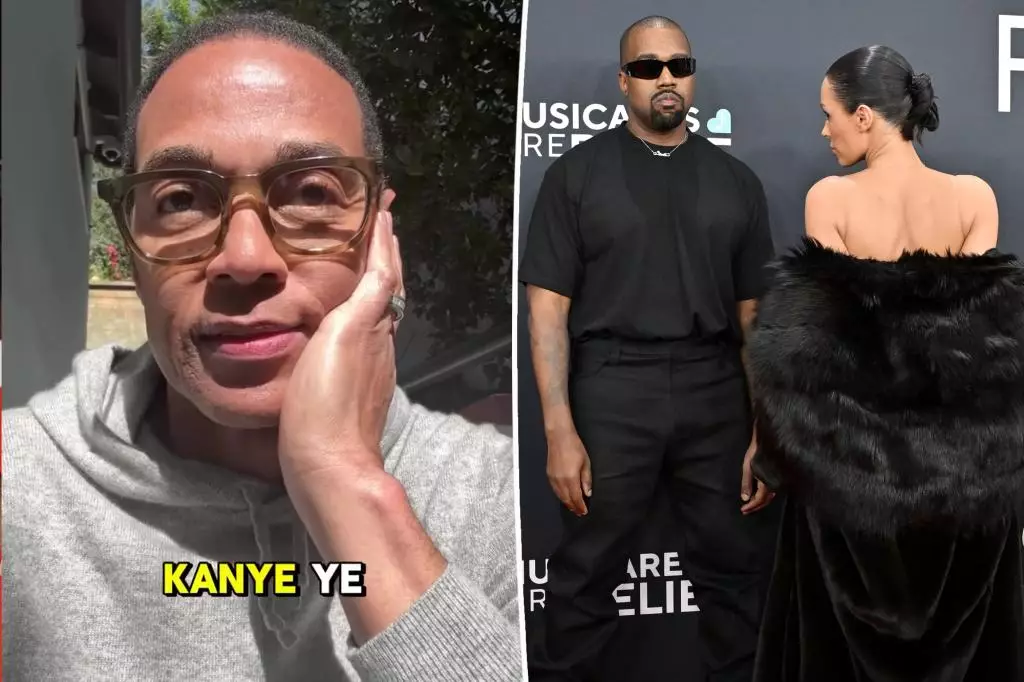The recent confrontation between CNN anchor Don Lemon and rapper Kanye West has escalated into a compelling public drama, marked by accusations, social media tirades, and personal grievances. Their conflicting narratives encapsulate broader tensions about race, respect, and media representation, particularly within the African American community.
The dispute ignited when Kanye West labeled Don Lemon a “coon” on social media after he reported a rumor suggesting that West and his wife, Bianca Censori, were removed from the Grammy Awards. This labeling was deeply charged, given the historical and cultural weight of the term in African American vernacular. For many, it conveys a sense of betrayal or disloyalty within the Black community. Lemon, acknowledging the gravity of the term, expressed his disappointment in a recent interview, asking for mutual respect as fellow Black men.
West’s claim specifically targeted Lemon’s credibility, painting him as a source of misinformation. However, Lemon was quick to clarify that he was merely sharing a rumor he had heard, one that was already circulating in the media. He did not witness the alleged confrontation firsthand, thus prompting a discussion about accountability in journalism and the responsibilities of public figures when addressing sensitive topics.
The underlying narrative of conflict appears to have been exacerbated by a separate incident during the Grammys itself. West and Censori made waves on the red carpet with their eye-catching outfits, sparking conversations about artistic expression versus decorum. Censori’s choice of a sheer dress exposed her body and challenged conventional fashion norms, a move that, while expected from an artist like West, was nonetheless surprising to a mainstream audience. The coupling of this audacious display with the rumor of their expulsion from the event resulted in an explosive combination, overshadowing the artistic aspects of their appearance.
Lemon’s commentary on the situation highlighted his perspective on West’s marketing prowess. He noted that West’s ability to stir conversation and provoke thought is almost unparalleled, reinforcing West’s image as a master promoter. However, Lemon’s surprise at the level of nudity involved raised questions about societal standards and the balance between artistic freedom and public reception.
Social media serves as both a megaphone and a battleground in this conflict. For West, platforms like Instagram allow him to reach an audience directly and swiftly express his discontent, albeit with a often inflammatory approach. Lemon, on the other hand, utilized social media to counter West’s accusations, underlining the immediacy and accessibility of online platforms, which amplify both voices but also the potential for misunderstandings.
Though West accused Lemon of starting a harmful rumor, Lemon’s rebuttal reflected the complexities of public discourse in a digital age. By emphasizing the importance of getting facts straight, Lemon positions himself as a responsible journalist attempting to navigate an increasingly chaotic media landscape. His pointed comments about West’s allegiance to controversial figures, like former President Trump, further illustrate the fissures within the African American community regarding political identity and representation.
This conflict highlights not only personal grievances but broader societal issues, including the dynamics of race, respect, and representation within the media. For Lemon, the term “coon” symbolically represents a betrayal of the shared struggles that many African Americans face. For West, it may serve as a defense mechanism against perceived attacks on his identity and artistry. The exchange serves as a reminder of the complexities surrounding race, respect, and public identity in contemporary America.
Ultimately, the public spat between Don Lemon and Kanye West invites reflection on the power of words, the nature of public figures, and the weight of representation. While both individuals have their narratives, the intertwining of their stories highlights how personal conflicts can resonate on a much larger scale, influencing dialogues surrounding race, respect, and responsibility in the media today. The repercussions of this exchange will likely reverberate beyond the immediate circumstances of the Grammy Awards, illuminating ongoing discussions pertinent to American culture and identity.

